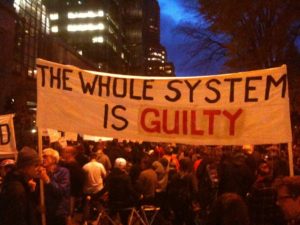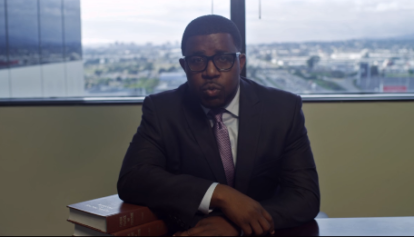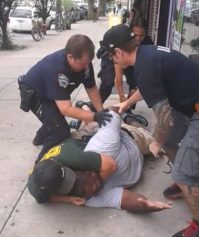
Graham was killed in 2012 when then-NYPD officer Richard Haste followed the teenager into his grandmother’s house and fired a single, deadly shot. Haste had been with the department for only four years when he killed Graham, but disciplinary records obtained by ThinkProgress show that Haste had six complaints filed against him in that time.
These complaints were made to and investigated by New York’s Civilian Complaint Review Board (CCRB), the largest independent oversight agency of the largest police force in the country. It’s unusual for an officer to have such a high number of complaints, and according to data spanning 2006 to 2017 on the CCRB website, less than 9 percent of the more than 36,000 NYPD officers have that many complaints on their records. Haste’s allegations also stand out because they occurred over the span of only 13 months.
The CCRB didn’t release these records willingly, they were leaked by an anonymous former employee. Graham’s mother, Constance Malcolm, had petitioned the city for the release of Haste’s full disciplinary history, but NYPD Records Access Officer Richard Mantellino informed her that handing over the records would violate Public Officers Law Section 87(2)(e)(i). That law states that such records would “interfere with law enforcement investigations or judicial proceedings” if they were released.
Haste was indicted by a grand jury in 2012, but the judge called for a new grand jury due to an administrative error. The second grand jury decided against indicting Haste and in 2016 the Department of Justice declined to file federal charges based on their own investigation. Haste resigned in late March after he was tipped off that the deputy commissioner was recommending his termination after conducting an internal disciplinary trial.
Constance Malcolm told ThinkProgress, “I have wondered: If Haste’s record had been transparent and if [Daniel] Pantaleo’s record had been transparent … is it possible that Ramarley and Eric Garner would be alive today?”
It’s not just the NYPD that is willing to overlook misconduct within its departments. An investigation conducted by New York public radio station WNYC found that police disciplinary records are effectively confidential in almost half of U.S. states. In other states, departments often withhold records in spite of court precedents.
According to Nana Gyamfi, a civil rights attorney and co-founder of Justice Warriors 4 Black Lives, reform begins with creating stronger systems of accountability, saying, “I think that you’re going to have get rid of this notion of police bill of rights, this notion that somehow almost every other profession has these systems of accountability, but we don’t have the right to know the histories of people who literally have a license to kill. It’s very disconcerting.”
Justice Warriors 4 Black Lives is a collaborative network of legal professionals who work in communities to provide workshops, training, policy development and legal services in support of current Black liberation movements. One of the services that Gyamfi provides is guiding people through the process of filing complaints against officers or departments.
For most people, filing a complaint is rarely worth the trouble, especially since agencies are given free reign in how they handle such filings. In states like California where personnel files are sealed, it can be difficult to establish that an officer has a history of abuse. Gyamfi admitted that she’s yet to see conduct complaints result in any disciplinary action.
“At most, they’ll be moved to an administrative role in another location, something like that” she said. “I haven’t seen complaints themselves lead to discipline. They are collected and filed, but we never find out whether any action is taken.”
Similar actions were taken against Daniel Pantaleo, the officer who killed Eric Garner in 2014 by administering an illegal chokehold. Pantaleo had 14 allegations of misconduct lodged against him prior to killing Garner, four of which were substantiated by the CCRB. Pantaleo has been assigned to desk duty without a firearm since September 2016 and received a 14 percent raise last year.
Part of law enforcement’s resistance to addressing conduct complaints has to do with protecting what’s left of their crumbling reputation. Gyamfi stressed that, “If they admit that this conduct is unacceptable, then they’re afraid that they won’t be able to continue to promote the belief that ‘It’s just one bad apple’ instead of a systemic issue that needs to be addressed.”
Initiatives like the Citizens Police Data Project (CPDP) are hoping that greater accountability will lead to improved conduct among law enforcement. The project is a decade-long collaboration between the Chicago-based media company Invisible Institute and the Mandel Legal Aid Clinic. In 2015, they published a database of 56,000 misconduct complaint records for more than 8,500 Chicago police officers. The data is still incomplete pending additional records to be released by Chicago PD, but what is provided paints a grim picture of intentional oversight within the department.
For example, the CPDP data shows that Chicago Officer Jason Van Dyke, who shot 17-year-old Laquan Daniels in 2014, had 20 conduct complaints on file, yet received no disciplinary action during his 15 years on the force.
Projects like the CPDP are an essential first step in holding departments accountable, but Gyamfi believes we’ll have to go further if the goal is to enact systemic change.
“It’s about abolishing the mindset that says that people who commit violations against their community need to be dehumanized, isolated, and segregated, and that at that point you can do whatever you want to them and they deserve it,” she said. “That entire mentality and the systems that support that mentality need to be taught and we need to create something completely different.
“It really means that we adopt a totally different way of addressing criminal behavior and creating community bonds.”


